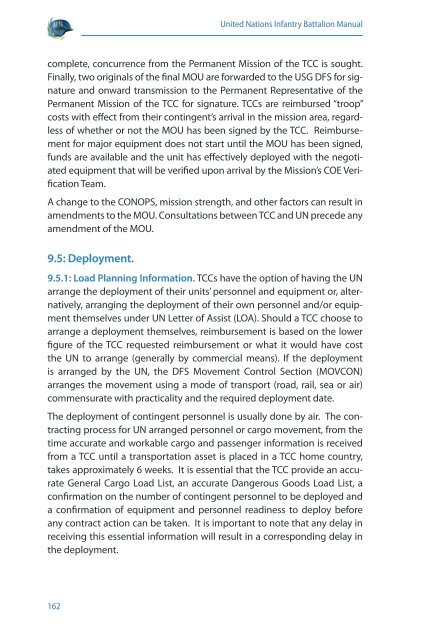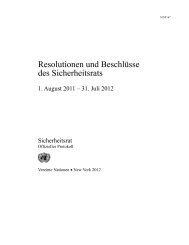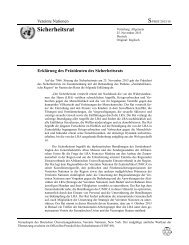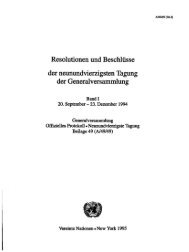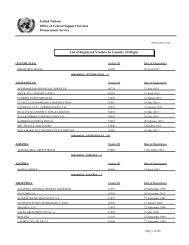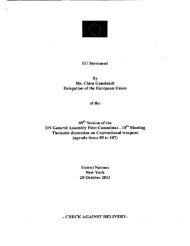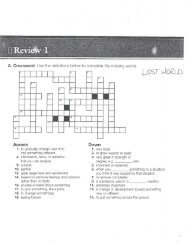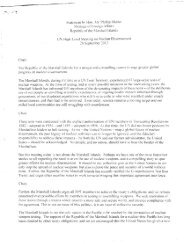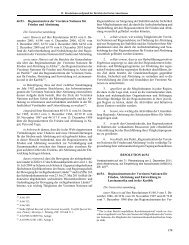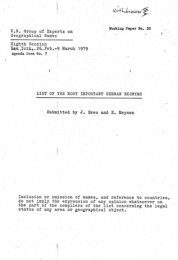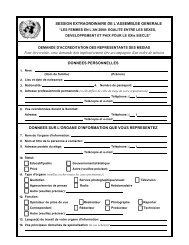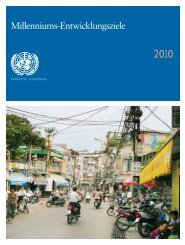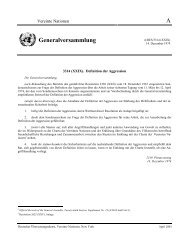United Nations Infantry Battalion Manual - the United Nations
United Nations Infantry Battalion Manual - the United Nations
United Nations Infantry Battalion Manual - the United Nations
Create successful ePaper yourself
Turn your PDF publications into a flip-book with our unique Google optimized e-Paper software.
162<br />
<strong>United</strong> <strong>Nations</strong> <strong>Infantry</strong> <strong>Battalion</strong> <strong>Manual</strong><br />
complete, concurrence from <strong>the</strong> Permanent Mission of <strong>the</strong> TCC is sought.<br />
Finally, two originals of <strong>the</strong> final MOU are forwarded to <strong>the</strong> USG DFS for signature<br />
and onward transmission to <strong>the</strong> Permanent Representative of <strong>the</strong><br />
Permanent Mission of <strong>the</strong> TCC for signature. TCCs are reimbursed “troop”<br />
costs with effect from <strong>the</strong>ir contingent’s arrival in <strong>the</strong> mission area, regardless<br />
of whe<strong>the</strong>r or not <strong>the</strong> MOU has been signed by <strong>the</strong> TCC. Reimbursement<br />
for major equipment does not start until <strong>the</strong> MOU has been signed,<br />
funds are available and <strong>the</strong> unit has effectively deployed with <strong>the</strong> negotiated<br />
equipment that will be verified upon arrival by <strong>the</strong> Mission’s COE Verification<br />
Team.<br />
A change to <strong>the</strong> CONOPS, mission strength, and o<strong>the</strong>r factors can result in<br />
amendments to <strong>the</strong> MOU. Consultations between TCC and UN precede any<br />
amendment of <strong>the</strong> MOU.<br />
9.5: Deployment.<br />
9.5.1: Load Planning Information. TCCs have <strong>the</strong> option of having <strong>the</strong> UN<br />
arrange <strong>the</strong> deployment of <strong>the</strong>ir units’ personnel and equipment or, alternatively,<br />
arranging <strong>the</strong> deployment of <strong>the</strong>ir own personnel and/or equipment<br />
<strong>the</strong>mselves under UN Letter of Assist (LOA). Should a TCC choose to<br />
arrange a deployment <strong>the</strong>mselves, reimbursement is based on <strong>the</strong> lower<br />
figure of <strong>the</strong> TCC requested reimbursement or what it would have cost<br />
<strong>the</strong> UN to arrange (generally by commercial means). If <strong>the</strong> deployment<br />
is arranged by <strong>the</strong> UN, <strong>the</strong> DFS Movement Control Section (MOVCON)<br />
arranges <strong>the</strong> movement using a mode of transport (road, rail, sea or air)<br />
commensurate with practicality and <strong>the</strong> required deployment date.<br />
The deployment of contingent personnel is usually done by air. The contracting<br />
process for UN arranged personnel or cargo movement, from <strong>the</strong><br />
time accurate and workable cargo and passenger information is received<br />
from a TCC until a transportation asset is placed in a TCC home country,<br />
takes approximately 6 weeks. It is essential that <strong>the</strong> TCC provide an accurate<br />
General Cargo Load List, an accurate Dangerous Goods Load List, a<br />
confirmation on <strong>the</strong> number of contingent personnel to be deployed and<br />
a confirmation of equipment and personnel readiness to deploy before<br />
any contract action can be taken. It is important to note that any delay in<br />
receiving this essential information will result in a corresponding delay in<br />
<strong>the</strong> deployment.


